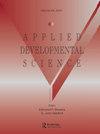Does variation in early childhood education matter more for dual language learners’ than for monolingual children’s language development?
IF 1.5
3区 心理学
Q3 PSYCHOLOGY, DEVELOPMENTAL
引用次数: 3
Abstract
Abstract Can early childhood education (ECE) support the societal language development of children from linguistically diverse backgrounds? This study examined how existing variation in classroom interaction quality (CLASS Pre-K), classroom composition (percentages of children from low-income backgrounds and dual language learners [DLLs]), and duration of attending German ECE were related to language trajectories from 30 to 73 months of age (n = 519 children in 154 classrooms). DLL status served as a focal moderator and parental education was considered as an additional moderator. Age-based growth models revealed interactions between DLL status and ECE characteristics. There were numerous intercept effects that endured over the age span studied. Interaction quality (emotional support) and classroom composition (percentage of DLLs) were related only to DLLs’ German language growth. Parental education did not moderate ECE effects. Hence, the observed range of variation in German ECE may matter for DLLs’ societal language development but may be of less relevance for monolingual children.幼儿教育的差异对双语学习者的语言发展比对单语儿童的语言发展更重要吗?
摘要幼儿教育(ECE)能支持来自不同语言背景的儿童的社会语言发展吗?这项研究考察了课堂互动质量(学前班)、课堂组成(低收入背景和双语学习者的百分比[DLLs])和参加德语ECE的持续时间的现有差异如何与30至73岁的语言轨迹相关 月龄(n = 154间教室的519名儿童)。DLL身份是一个协调人,家长教育被视为一个额外的协调人。基于年龄的增长模型揭示了DLL状态和ECE特征之间的相互作用。在所研究的年龄跨度内,存在许多拦截效应。互动质量(情感支持)和课堂组成(DLL的百分比)仅与DLL的德语增长有关。父母教育并没有缓和欧洲经委会的影响。因此,观察到的德语ECE的变化范围可能对DLL的社会语言发展很重要,但对单语儿童的相关性可能较小。
本文章由计算机程序翻译,如有差异,请以英文原文为准。
求助全文
约1分钟内获得全文
求助全文
来源期刊

Applied Developmental Science
PSYCHOLOGY, DEVELOPMENTAL-
CiteScore
12.00
自引率
2.60%
发文量
23
期刊介绍:
The focus of this multidisciplinary journal is the synthesis of research and application to promote positive development across the life span and across the globe. The journal publishes research that generates descriptive and explanatory knowledge about dynamic and reciprocal person-environment interactions essential to informed public dialogue, social policy, and preventive and development optimizing interventions. This includes research relevant to the development of individuals and social systems across the life span -- including the wide range of familial, biological, societal, cultural, physical, ecological, political and historical settings of human development.
 求助内容:
求助内容: 应助结果提醒方式:
应助结果提醒方式:


